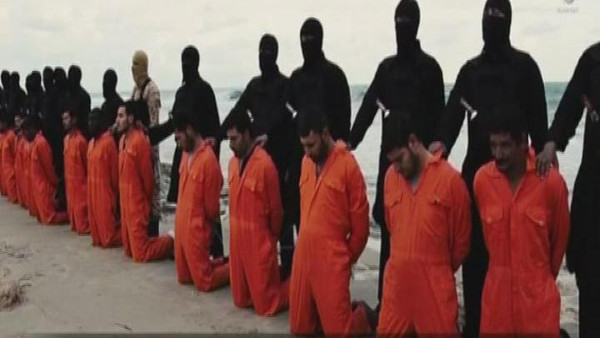Egyptians face religious extremism with song
George Mikhail/ Al-Monitor/October 12/15
CAIRO — Sheikh Walid Shahin did not resort to lecterns or preaching in mosques to try to change religious rhetoric in Egypt. His faith in national unity and common values and principles among different religions pushed him to use his passion for music to communicate his message. His religious education at Al-Azhar University did not stop him from also studying musicology. He has even contributed to the music-making and hymnody of several television drama series, such as the show “The People of Cairo.”
Shahin was affected by the January 25 Revolution, in which he participated and protested in Tahrir Square until Egyptian President Hosni Mubarak stepped down Feb. 11, 2011. Back then, Shahin realized that the way to real change is in national unity. He translated this idea into his art and started a group to perform hymns with Christian hymn singer Michael Rida. While Shahin sings for the Virgin Mary and chants poems by Pope Shenouda III, Rida chants the poems of Sheikh Sayed Al Nakshabandi.
“Rev. Yousef Samir, the parish priest of St. Michael Church, came up with the idea after he invited me, as well as Rida, to perform hymns and chants at the No to Violence event. Suddenly, he asked us to perform together in one section,” Shahin told Al-Monitor.
“Later on, I got together with Rida and was really surprised by his vocal abilities, especially in singing Sheikh Nakshabandi. Thus, we agreed to do a duet and perform a mix of Islamic chants and religious hymns.” Shahin said he performed hymns for the Virgin Mary even before establishing the group. “This was upon the request of one of the evangelical church pastors in the Mother’s Day festival. I chanted a hymn dedicated for the virgin, as she is a common icon between Muslims and Christians.”
Rida and Shahin said they were surprised to receive a five-minute standing ovation after their performance at the No to Violence event. “People are always amazed when I perform hymnody for the Virgin Mary, and the poems by Pope Shenouda III. They were even more surprised when Rida sang Islamic chants by Sheikh Nakshabandi,” Shahin said.
Nakshabandi, nicknamed the “Master of Eulogists,” was one of the most famous hymn singers in the history of Islamic religious choirs.
“In our group, we rely on common qualities and teachings among religions and icons that are revered by all Egyptians, such as the Virgin Mary, Pope Shenouda III and Sheik Nakshabandi,” Shahin said. About the obstacles they face as a group, he said, “I was met with extremist views, but I did not let it affect the group. We face another obstacle in that most of the recitals are held in churches only, as the state is not taking advantage of what we are doing to combat religious extremism with art, instead of repeated talks about renewing the religious rhetoric and supporting national unity. I think art is a universal language.”
It’s been difficult to fund events. They have many fans, but producers and the government aren’t interested in “pointless” artworks, Shahin said. The men established the group three years ago following the January 25 Revolution. “We were surprised that the idea has echoed very well among people, especially after the shows we performed in the three events: No to Violence, We Love Egypt and A Bit of Love festivals,” Rida said.
“My chanting for Sheikh Nakshabandi was met with much praise. However, I also heard some extremist and negative feedback, as some refuse [to accept] that a Coptic sings Islamic chants while also performing Christian hymns,” he added. “Art is the best way to convey messages and change well-instilled ideas,” Rida continued. “Our group is only being invited to perform by a few churches, although many believe that this idea would contribute to fighting against terrorism and extremism and help consolidate the concept of national unity practically without any slogans,” he added.
The group showed up on the television program Al-Hayat al-Youm (Life Today) with broadcaster Lubna Assal, who described their work as the “perfect example to renewing the religious rhetoric and consolidating tolerance, love, fighting against hatred and extremism.” Ibrahim Amin, a scholar at Al-Azhar, told Al-Monitor that he calls upon the state and Al-Azhar to support the group at the international level to convey a message to the West that Egypt celebrates national unity. “Concerts at the world level should be organized for the group to convey the message that the Egyptian people reject all forms of extremism and seize every opportunity to instill national unity,” Amin said.
“Renewing the religious rhetoric and the consolidation of national unity is based on common principles and teaching among all religions, not on dogmatic differences. Art is the best way to convey this message,” he added. Pastor Rifaat Fikri, head of the Media and Publishing Council at the Evangelical Church, said the state should support the group financially, help it perform in cultural halls throughout Egypt and allow audiences to attend performances free of charge.
“Any new idea will be faced with many hardships in the beginning,” he said of the group’s struggle, “but I believe a genuine idea will eventually reach the people.”
He added, “Egypt will fight terrorism with all means possible, including art, because it is a powerful tool in the face of extremist groups, [as are] intellectual seminars and meetings. National unity will not be achieved through slogans, but through other means that are appealing to the simple, ordinary people such as art and singing.”
**George Mikhail is a freelance journalist who specializes in minority and political issues. He graduated from Cairo University in 2009 and has worked for a number of Egyptian newspapers.






















